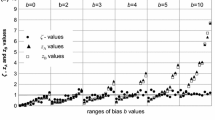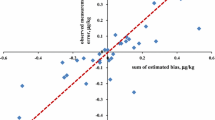Abstract
Data from proficiency testing can be used to increase our knowledge of the performance of populations of laboratories, individual laboratories and different measurement methods. To support the evaluation and interpretation of results from proficiency testing an error model containing different random and systematic components is presented. From a single round of a proficiency testing scheme the total variation in a population of laboratories can be estimated. With results from several rounds the random variation can be separated into a laboratory and time component and for individual laboratories it is then also possible to evaluate stability and bias in relation to the population mean. By comparing results from laboratories using different methods systematic differences between methods may be indicated. By using results from several rounds a systematic difference can be partitioned into two components: a common systematic difference, possibly depending on the level, and a sample-specific component. It is essential to distinguish between these two components as the former may be eliminated by a correction while the latter must be treated as a random component in the evaluation of uncertainty.
Similar content being viewed by others
Author information
Authors and Affiliations
Additional information
Received: 20 November 2000 Accepted: 3 January 2001
Rights and permissions
About this article
Cite this article
Nilsson, G. An error model for evaluation and interpretation of proficiency testing. Accred Qual Assur 6, 147–150 (2001). https://doi.org/10.1007/s007690100310
Issue Date:
DOI: https://doi.org/10.1007/s007690100310




